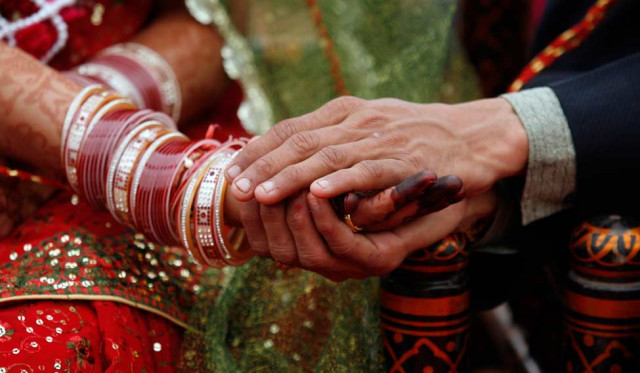Punjab Assembly passes Sikh family law
For the first time since Pakistan's inception, family matters of the community will be regulated separately

Punjab Assembly passes Sikh family law. PHOTO: REUTERS
The Punjab Sikhs Anand Karaj Marriages Act, 2017 was first moved in the provincial assembly by Sardar Ramesh Singh Arora on October 24, 2017. After garnering support from Punjab Chief Minister Shehbaz Sharif and other ministers, including Punjab Law Minister Rana Sanaullah and Parliamentary Secretary and Punjab Minister for Human Rights and Minorities Affairs Khalil Tahir Sindhu, the bill was presented before the assembly on Wednesday.
Arora thanked the opposition legislators, treasury benches and especially the Punjab chief minster to pass the first-of-its-kind law in the world.
Members of the Sikh community seemed overjoyed with the completion of the process of the bill as they attended the assembly proceedings to witness the historic moment. They maintained that it was a good omen which showed love and respect for their community members and allowed them to protect the family matters.
Punjab Sikh family law to make history
Another good omen
Lawmakers who are mostly at loggerheads with each were seen united in Wednesday’s proceedings as two resolutions, a special committee’s recommendation report and the historic Sikh marriage act, were unanimously passed.
However, the special committee’s report was put on the agenda after a Pakistan Tehreek-e-Insaf (PTI) lawmaker strongly reacted and questioned why the report had not been presented despite a lapse of over a month.
The report is about parliamentarians’ recommendations to reduce the percentage of weightage afforded to the entry test of MCAT and ECAT to 10 per cent, Matric and equivalent to 20 per cent and Pakistan FSc/HSSC/Intermediate/equivalent to 70 per cent – a move aimed at reining in the education mafia minting money in the name of entry tests
This time the mover was PTI’s Mian Aslam Iqbal and, subsequently, the PA agreed to forward the report to the federal authorities concerned and get the recommendations approved for implementation.
Later, two out of five resolutions were unanimously passed. One resolution was about imposing a complete ban on dance parties at educational institutes across the province.
The resolution was passed unanimously against ‘DJ Nights’ in educational institutes. Pakistan Muslim League-Nawaz (PML-N) lawmaker Sheikh Aijaz Ahmed presented the resolution.
The resolution said that western culture was being promoted at educational institutions, and wayward tendencies were taking place among students.
The second resolution was of PTI’s Dr Nausheen Hamid about stopping torture on children with disabilities by taking steps through legislation.
Three other reports were also presented that were later referred to the committees concerned. Three resolutions presented in the PA were deferred until next session.
However, temperatures rose in the assembly when opposition leader Mian Mehmood-ur-Rashid congratulated the lawmakers over the Senate chairman coming from Balochistan for the first time. This led to lawmakers chanting slogans against each other.
This was followed by Pakistan Peoples Party legislator Faiza Ahmad Malik staging a walkout, saying the treasury benches had humiliated the sentiments of people of Balochistan by chanting ‘shame shame’ when opposition lawmakers celebrated the election of Senate chairman from Balochistan.
Wednesday’s proceedings started on 11:40am while the scheduled time was 10am. After completing the agenda items, the PA speaker adjourned the session till 10am today (Thursday).
The Punjab Sikhs Anand Karaj Marriages Act 2018
Definition of Sikh and religion
As prescribed in the law, Sikh means a person who follows Sikh religion as a monotheistic Sikh religion and believes in the scriptures of Guru Granth Sahib and does not subscribe to any other religion, and Sikh religion means the belief in Akalpurakh (One Eternal Being) the ten Gurus from Guru Nanak to Guru Gobind Singh and the acceptance of Guru Granth Sahib as the Eternal-Living Guru.
Solemnisation of Marriage
No male or female of the Sikh community who will be below the age of eighteen years could solemnise marriages under the law.
Saving of Marriages
Nothing in the Act will affect the validity of any marriage duly solemnised according to any other marriage ceremony customary among the Sikhs.
Registration of Marriages
Every marriage between Sikhs shall be registered under the Act. For the purpose of the registration of marriages under the Act, the government, in the prescribed manner, shall grant licence to one or more persons professing Sikh religion to be called Anand Karaj Registrar, authorising him to grant Anand Karaj Certificate.
The bridegroom and the bride or a Granthi shall fill the Anand Karaj form and present it, within thirty days of the marriage, to the Anand Karaj Registrar for registration of the marriage and a copy thereof shall be sent to the chairman. Chairman means the chairman of a union council or municipal committee or any officer authorised by the government to perform the functions of the chairman under the act.
A marriage, which is not solemnised by the Anand Karaj Registrar, shall, for the purpose of registration under the Act, be reported within thirty days of the solemnisation of the marriage to him (chairman) by the Granthi or the person who solemnised the marriage.
Fine
The violators will be punished and fined which may extend to ten thousand.
Dissolution of Marriage
Any party that wishes to dissolve the marriage shall give to the chairman notice in writing of his or her intention to do so and shall supply a copy thereof to the other party. Within thirty days of the receipt of the notice under subsection (1), the chairman shall constitute an arbitration council in the prescribed manner for the purpose of bringing about reconciliation between them and the council shall take all steps necessary to that effect.
If reconciliation is not effected within 90 days from the date of the notice, the chairman shall, after the lapse of the ninety days, declare the marriage to have been dissolved and issue the certificate of the dissolution of marriage in prescribed manner.
Read the bill here.



















COMMENTS
Comments are moderated and generally will be posted if they are on-topic and not abusive.
For more information, please see our Comments FAQ